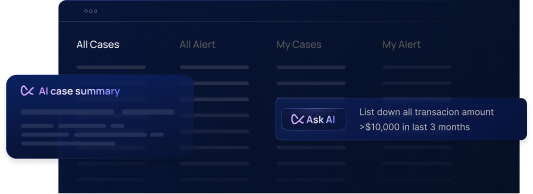AT A GLANCE
Money laundering costs the global economy $800 billion to $2 trillion annually (2-5% of global GDP). It undermines financial system integrity, enables criminal enterprises, distorts markets, increases compliance costs, dampens foreign investment, and exposes banks to billions in regulatory fines and sanctions to brokerages and trusts. The three-stage process (placement, layering, integration) exploits banking vulnerabilities to disguise illegal money as legitimate funds. Prevention requires comprehensive Know Your Customer (KYC) policy, real-time transaction monitoring, AI-powered detection systems, employee training, and international cooperation. Financial institutions face up to $10.4 billion in annual penalties for AML failures, while individuals convicted of money laundering face up to 20 years imprisonment and complete asset forfeiture.
Money laundering represents one of the most damaging financial crimes affecting the global economy. This illicit activity doesn't just harm immediate victims—it undermines entire financial systems, destabilizes economies, distorts markets, and erodes public trust in banking institutions. From major banks facing billions in regulatory policies to small businesses caught in compliance violations, money laundering's ripple effects touch everyone in the financial ecosystem.
For financial institutions, the stakes have never been higher. Global regulatory penalties for anti-money laundering (AML) policies failures reached $10.4 billion in recent years, while reputational damage from money laundering scandals can devastate institutions overnight. Understanding how money laundering operates, its systemic impacts, and proven prevention strategies is essential for any organization handling financial transactions.
This guide examines money laundering's effects on financial systems, explores its far-reaching economic consequences, and provides actionable solutions that financial institutions can implement today.
What Is Money Laundering and How Does It Work?
Money laundering is the process of disguising illegally obtained money so it appears to have come from legitimate sources. Criminals use this technique to hide the true origins of wealth generated from illegal activities including drug trafficking, fraud, corruption, terrorism, human trafficking, and tax evasion.
The process allows criminals to access and utilize their ill-gotten gains without attracting law enforcement attention. By making illegal money appear legitimate, criminals can invest in businesses, purchase assets, fund additional criminal operations, and enjoy their wealth without detection.
The Three Stages of Money Laundering
Placement is the initial entry point where criminals introduce illegal cash into the financial system. Common methods include depositing cash in small amounts across multiple accounts (structuring), purchasing high-value assets with cash, using currency exchange services, or funneling money through cash-intensive businesses like restaurants or casinos.
Layering involves moving money through multiple transactions and accounts to obscure its criminal origins. Techniques include transferring funds between accounts in different countries, converting money into different currencies repeatedly, purchasing and selling investments, using shell companies, and conducting wire transfers through numerous intermediary accounts.
Integration returns the now-laundered money into the legitimate economy where criminals can use it freely. Methods include investing in legitimate businesses, purchasing real estate, creating false loan repayments, and using funds for everyday expenses.
How Does Money Laundering Affect the Financial System?
Money laundering creates profound systemic vulnerabilities that compromise financial system integrity, stability, and trustworthiness at multiple levels.
Undermines Financial System Integrity and Trust
When financial institutions become conduits for criminal money, public confidence in the banking system erodes dramatically. Customers question whether their banks are complicit in criminal activities, investors become wary of financial markets, and international partners lose faith in a country's financial oversight.
Major money laundering scandals have destroyed centuries-old banking institutions overnight. When customers discover their bank facilitated money laundering, they withdraw deposits, close accounts, and move their business elsewhere. This trust erosion takes years—sometimes decades—to rebuild.
Increases Compliance Costs for Law-Abiding Institutions
Financial institutions must invest billions in anti-money laundering compliance programs. These costs include sophisticated transaction monitoring systems, dedicated compliance personnel, customer due diligence procedures, suspicious activity reporting infrastructure, regular audits and assessments, and ongoing staff training programs.
Smaller financial institutions struggle disproportionately with compliance costs. A community bank might spend $500,000 to $2 million annually on AML compliance—costs that pass to customers through higher fees, reduced deposit interest rates, and increased banking service costs.
Enables and Empowers Criminal Enterprises
Money laundering is the lifeblood of organized crime. Without the ability to launder proceeds, criminal enterprises cannot sustain large-scale operations. Access to laundered funds allows criminals to expand operations, bribe officials, purchase sophisticated equipment, hire additional operatives, and establish international networks.
Drug cartels, human trafficking rings, terrorist organizations, and fraud syndicates all depend on money laundering to convert illegal proceeds into usable assets. By successfully laundering money through the financial system, these organizations gain legitimacy and operational capacity that would otherwise be impossible.
Dampens Foreign Investment and Economic Growth
Countries with weak anti-money laundering controls experience reduced foreign direct investment. International corporations avoid jurisdictions where financial crime is prevalent due to reputational risks, compliance complications, and potential legal liabilities.
When major institutions like HSBC, Deutsche Bank, or Danske Bank face money laundering scandals, investor confidence in entire national financial systems suffers. Foreign investors demand higher returns to compensate for increased risk, making capital more expensive and economic growth more difficult.
What Are the Consequences of Money Laundering?
Money laundering generates far-reaching consequences that extend beyond financial institutions to impact governments, economies, and society.
Legal and Criminal Consequences
Money laundering convictions carry severe penalties. In the United States, individuals face up to 20 years imprisonment per violation, fines up to $500,000 or twice the value of laundered property, asset forfeiture of all involved property, and permanent criminal records affecting future employment.
Financial institutions face corporate criminal charges, multi-billion dollar regulatory fines, mandatory compliance monitors, loss of banking licenses in severe cases, business operation restrictions, and personal liability for officers who fail oversight responsibilities.
Economic Distortion and Market Instability
Money laundering distorts economic data that governments and businesses use for decision-making. Effects include artificial inflation in real estate and asset prices, distorted business valuations, unreliable economic statistics, misallocated resources, and increased market volatility as large criminal funds move suddenly.
Reputational Damage
Money laundering scandals destroy institutional reputations built over decades. Consequences include massive customer account closures, difficulty attracting new customers, loss of correspondent banking relationships, investor divestment and plummeting stock prices, and difficulty recruiting top talent.
Danske Bank's money laundering scandal illustrates this damage. After revelations that its Estonian branch processed over $200 billion in suspicious transactions, the bank faced criminal investigations in multiple countries, executive resignations, billions in fines, and permanent reputational harm.
How Does Money Laundering Affect the Economy?
Money laundering's economic impacts extend to affect national economies, international trade, currency stability, and global financial systems.
Transfers Economic Power from Legitimate to Criminal Actors
When criminals successfully launder money, they transfer economic decision-making power from markets, governments, and citizens to criminal organizations. Laundered funds allow criminals to acquire businesses, real estate, political influence, and market control that legitimate actors cannot match.
This power transfer fundamentally distorts how economies function. Instead of market forces determining which businesses succeed, criminal funding decisions drive outcomes.
Undermines Government Tax Revenue
Money laundering facilitates tax evasion on a massive scale. When criminals hide income sources through laundering, they avoid paying taxes on illegal proceeds. The tax revenue lost—estimated at hundreds of billions annually worldwide—represents funding that could support education, healthcare, infrastructure, and public safety.
Creates Barriers to International Trade
Countries with serious money laundering problems face sanctions and exclusion from international financial systems. The Financial Action Task Force (FATF) maintains lists of high-risk jurisdictions, triggering enhanced due diligence requirements, correspondent banking restrictions, trade finance limitations, and investment barriers.
What Are the Repercussions of Indulging in Money Laundering and Becoming a Money Mule?
Money mules—individuals who transfer illegally acquired money on behalf of criminals—face severe consequences, even if they claim ignorance.
Criminal Charges and Legal Consequences
Money mules face the same criminal charges as primary money launderers, including money laundering charges carrying up to 20 years imprisonment, wire fraud and bank fraud charges, conspiracy charges, and asset forfeiture. Courts show little leniency toward money mules who claim they "didn't know" the money was illegal.
Financial Penalties and Asset Seizure
Beyond criminal fines, money mules face comprehensive financial destruction including immediate account freezes, seizure of all funds and assets connected to money laundering, civil forfeiture proceedings, inability to open bank accounts, and damaged credit ratings persisting for years.
Permanent Damage to Financial Reputation
Money mule participation creates permanent financial records including placement on banking industry watchlists, reporting to credit bureaus, inclusion in financial crime databases, difficulty obtaining loans or credit cards, and rejection from employment requiring background checks.
Personal Safety Risks
Money mules who cooperate with law enforcement or fail to deliver laundered funds face potential violence from criminal organizations that engage in intimidation and retaliation.
How Do Banks Prevent Money Laundering?
Financial institutions employ comprehensive, multi-layered strategies combining technology, procedures, and human oversight.
Customer Due Diligence and Know Your Customer (KYC) Programs
Banks verify customer identities before establishing relationships through collecting government-issued identification, confirming addresses, checking sanctions lists and politically exposed persons (PEP) databases, understanding business relationships, and assessing expected transaction patterns.
Enhanced due diligence applies to high-risk customers including politically exposed persons, customers from high-risk jurisdictions, businesses in high-risk industries, and relationships involving large transaction volumes.
Real-Time Transaction Monitoring Systems
Modern AML systems analyze every transaction in real-time, flagging unusual activities such as structuring deposits to avoid reporting thresholds, rapid movement of funds, transactions inconsistent with customer profiles, and sudden changes in transaction patterns.
Machine learning algorithms continuously improve detection accuracy by learning from historical patterns, reducing false positives, and adapting to emerging money laundering techniques.
Suspicious Activity Reporting (SAR)
When banks detect potentially suspicious activity, regulations require filing Suspicious Activity Reports with financial intelligence units. Banks file millions of SARs annually—over 3.5 million in the United States alone—providing law enforcement with crucial intelligence.
Sanctions Screening
Banks screen all customers and transactions against Office of Foreign Assets Control (OFAC) sanctions lists, United Nations sanctions programs, European Union sanctions, and politically exposed persons databases at account opening, transaction processing, and during periodic reviews.
How Can Money Laundering Be Prevented?
Preventing money laundering requires coordinated efforts across financial institutions, governments, law enforcement, and technology providers.
Implement Comprehensive AML Policies
Financial institutions must establish detailed anti-money laundering programs encompassing customer identification procedures, risk assessment methodologies, transaction monitoring protocols, suspicious activity reporting procedures, record retention requirements, and independent testing programs.
Adopt Advanced Technology Solutions
Modern money laundering techniques require sophisticated detection capabilities. Financial institutions should deploy AI and machine learning for pattern detection, blockchain analysis tools for cryptocurrency transactions, network analytics to identify hidden relationships, automated sanctions screening, and integrated case management platforms.
Flagright's comprehensive AML compliance solution provides real-time transaction monitoring, dynamic risk scoring, KYC/KYB orchestration, sanctions screening, blockchain analysis, and centralized regulatory reporting.
Foster International Cooperation
Money laundering is inherently transnational, requiring global cooperation including participating in information-sharing networks, supporting financial intelligence unit collaboration, implementing Financial Action Task Force (FATF) recommendations, and establishing cross-border investigation protocols.
Increase Transparency in Corporate Structures
Anonymous shell companies represent major money laundering vulnerabilities. Reforms should include beneficial ownership registries, restrictions on nominee directors, enhanced transparency for trusts, and public access to corporate ownership information.
Frequently Asked Questions About Money Laundering
Why is money laundering illegal?
Money laundering is illegal because it enables criminals to profit from illegal activities, facilitates organized crime and terrorism, undermines financial system integrity, evades taxes owed to governments, and distorts legitimate economic activity. By making illegal money appear legitimate, money laundering allows criminal enterprises to operate and expand their harmful activities.
What happens to money in money laundering cases?
Money and assets connected to money laundering are subject to civil and criminal forfeiture. Law enforcement seizes cash, bank accounts, real estate, vehicles, businesses, and other property purchased with or used to facilitate money laundering. Forfeited assets often fund law enforcement operations or compensate crime victims.
How do money launderers get caught?
Money launderers are caught through suspicious activity reports from financial institutions, law enforcement investigations, informant tips, international cooperation, forensic accounting, undercover operations, and pattern analysis across accounts. Most successful prosecutions result from banks detecting and reporting suspicious transactions.
Can you go to jail for money laundering?
Yes, money laundering carries severe criminal penalties including up to 20 years imprisonment per violation under U.S. federal law, substantial fines up to $500,000 or twice the value of laundered property, asset forfeiture of all involved property, and additional charges for underlying criminal activities.
Which industries are most vulnerable to money laundering?
High-risk industries include casinos and gambling operations, real estate transactions, luxury goods dealers, money service businesses, trade-based businesses with complex supply chains, cryptocurrency exchanges, and cash-intensive businesses like restaurants and car washes.
What should I do if someone asks me to receive money in my account?
Never allow others to use your bank account to receive or transfer funds. This is money mule recruitment. Report the solicitation to your bank immediately, contact local law enforcement, notify your financial intelligence unit (FinCEN in the U.S.), and document all communications. Participation carries severe criminal, financial, and personal consequences.
How much money is laundered globally each year?
The United Nations estimates that between $800 billion and $2 trillion is laundered annually worldwide, representing approximately 2-5% of global GDP. Only about 1% of laundered money is successfully seized by authorities, demonstrating the challenge of combating this crime.
What are the warning signs of money laundering?
Red flags include customers reluctant to provide identification, transactions inconsistent with stated business purpose, frequent large cash deposits, rapid movement of funds, structuring transactions to avoid reporting thresholds, unusual international wire transfers, business revenues inconsistent with activity levels, complex ownership structures, and transactions involving high-risk jurisdictions.
Key Takeaways: Essential Money Laundering Prevention Strategies
For Financial Institutions
Implement comprehensive KYC and enhanced due diligence for high-risk customers
Deploy real-time transaction monitoring with AI-powered pattern detection
Establish robust internal controls with clear escalation procedures and oversight
File suspicious activity reports promptly when detecting unusual transactions
Screen all transactions against sanctions lists at multiple points
Conduct regular employee training on red flags and reporting obligations
Perform independent audits of AML program effectiveness annually
Invest in advanced technology including machine learning and blockchain analysis
For Individuals and Businesses
Never allow others to use your bank accounts to receive or transfer money
Report suspicious activities financial solicitations** to your bank and authorities immediately
Verify the legitimacy of business partners before engaging in transactions
Cooperate fully with financial institution requests for information and documentation
Report suspected money laundering to local law enforcement and financial intelligence units
Conclusion
Money laundering represents one of the most pervasive and damaging financial crimes affecting the global economy, impacting traditional financial institutions as well as digital banks and neobanks. Its impacts extend far beyond immediate criminal proceeds to undermine financial system integrity, destabilize economies, enable organized crime, and erode public trust in financial institutions.
For financial institutions, multi-billion dollar penalties, reputational destruction, and potential criminal liability make effective anti-money laundering programs business imperatives rather than mere compliance obligations. Comprehensive AML strategies combining advanced technology, robust procedures, skilled personnel, international cooperation, and oversight of remittances can significantly reduce money laundering risks.
Solutions like Flagright's comprehensive AML compliance platform provide financial institutions with the tools needed to detect suspicious activities in real-time, assess risks dynamically, maintain regulatory compliance, and protect themselves from exploitation by criminals.
The fight against money laundering requires sustained commitment from all stakeholders—financial institutions, regulators, law enforcement, technology providers, and ordinary citizens. Together, we can close the vulnerabilities criminals exploit, disrupt illicit financial flows, and build financial systems worthy of public trust. Contact us to schedule a free demo.




.svg)





















